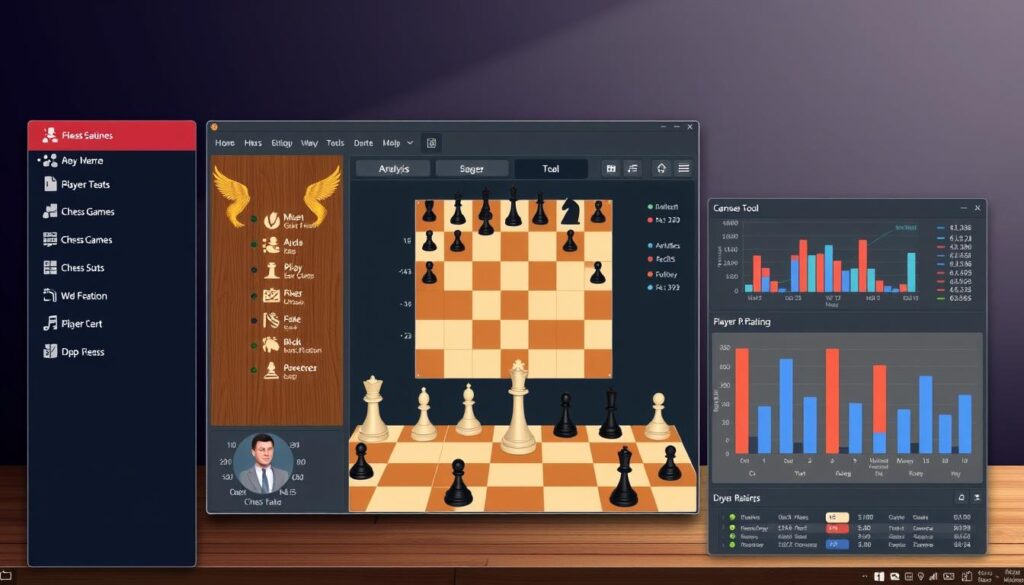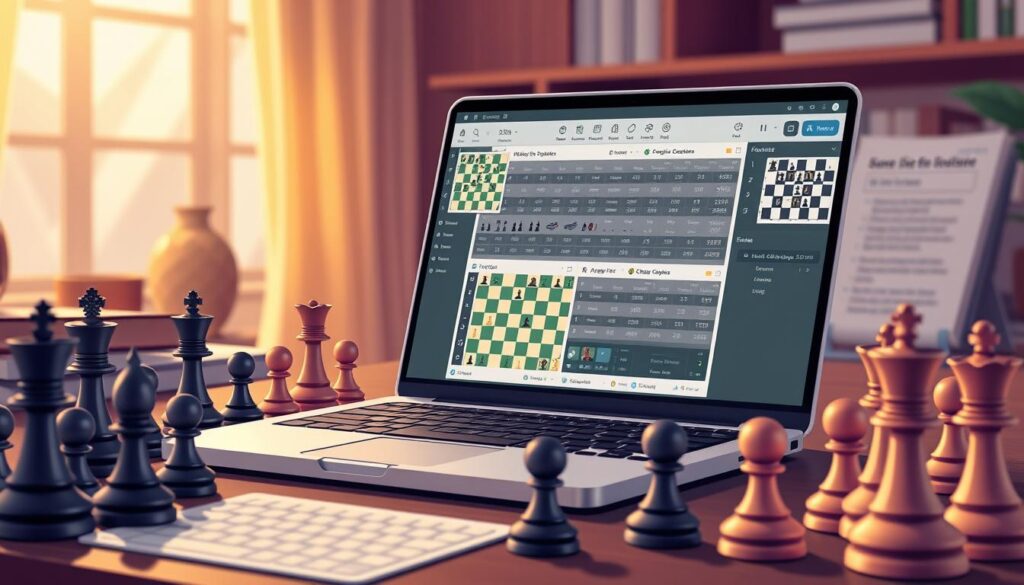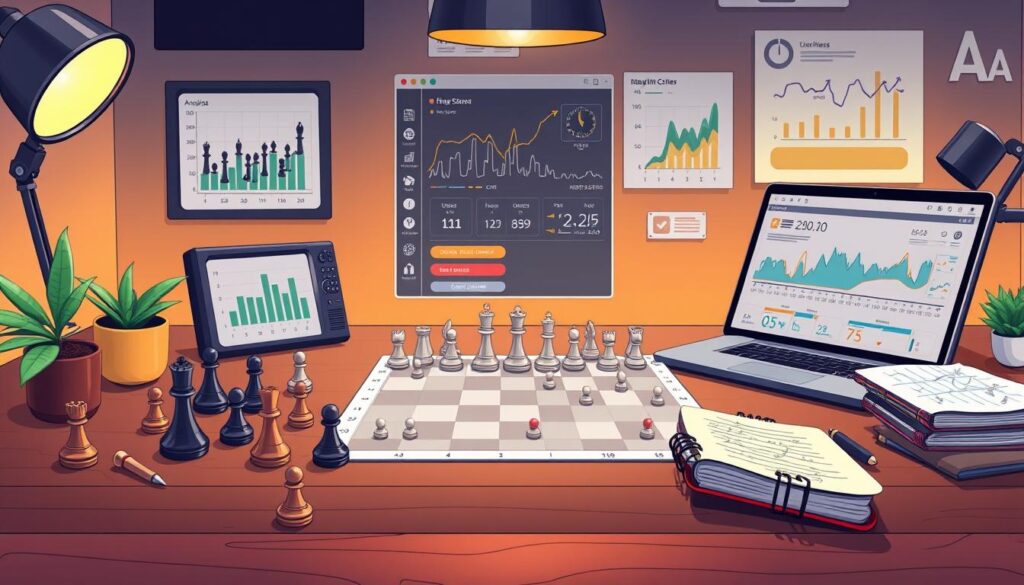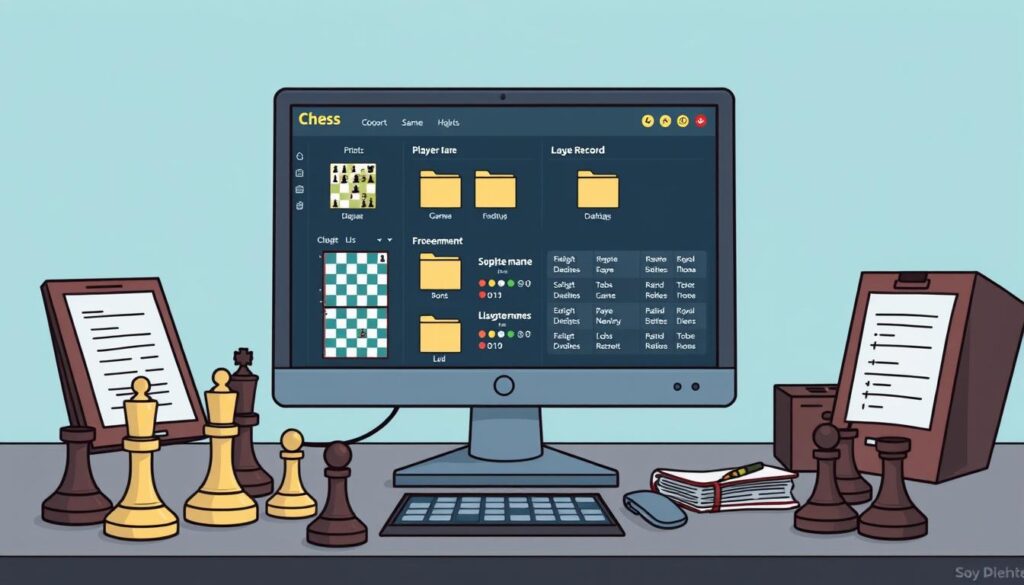Are you ready to boost your chess skills from beginner to pro without years of study? Chess Assistant software might be the answer you’ve been looking for.
Chess Assistant is a top-notch tool for analyzing chess. It helps beginners and intermediate players improve their strategy. It has a huge database of about 8.9 million games and adds 3,000 new ones every week.
If you love chess or want to get better at it, Chess Assistant 25 is for you. It has advanced engines like Stockfish and fun learning modules. These features make learning chess exciting and quick.
Table of Contents
Understanding Chess Assistant Basics and Interface

Starting with chess software can be tough for beginners. Chess Assistant has a user-friendly interface. It makes managing and analyzing chess games easy.
When you open the chess assistant interface, you see a powerful system. It’s like organizing files on your computer:
- Create nested folders using intelligent classifiers
- Assign icons and descriptions to each folder
- Set automatic classification criteria
- Store game lists and chess trees
The software has key features for game analysis. The chess assistant interface has tools like:
- Automatic opening annotation
- Blunder detection systems
- Multi-pass game analysis
- Interactive analysis capabilities
Whether you play casually or seriously, these tools help a lot. The software is easy to use. Even new users can learn its advanced features quickly.
Setting Up Your First Chess Database (chess database management)

Creating a chess database is key for serious players. It helps organize and analyze games. Chess Assistant 25 offers tools for managing chess data easily.
When you start, you’ll get two main databases:
- HugeBase: Over 7 million professional chess games
- Correspondence Database: 596,000+ correspondence chess matches
To organize your games, follow these steps:
- Select “Create New Database” in Chess Assistant
- Choose your database format
- Name your database for easy identification
- Select import options for existing games
Chess Assistant has a Premium Game Service. It updates your database weekly with 3,000 new games. This keeps your collection up-to-date and complete.
The software’s search features are advanced. You can filter games by player names, openings, tournaments, and more. This makes your game library personal and easy to search.
How to Use Chess Assistant for Game Analysis

Chess game analysis gets a boost with Chess Assistant’s advanced tools. It offers a wide range of features to improve your chess training. These tools help you understand complex positions better.
The software uses top computer chess engines like Stockfish for deep analysis. These engines offer different ways to analyze chess positions:
- Multi-pass game analysis
- Interactive analysis mode
- Background analysis capabilities
Automatic features in Chess Assistant make learning easier. It can spot blunders in your game. You can also customize how you analyze chess positions.
Key features for analysis include:
- Marking specific positions for detailed review
- Guiding the computer chess engine during interactive sessions
- Running continuous background analysis
Chess Assistant gives you access to millions of historical games. This makes it a unparalleled platform for deep chess analysis and strategy improvement.
Managing and Organizing Chess Games (chess computer engine)

Chess Assistant makes organizing your chess games easy. It has tools that help you sort through millions of games with just a few clicks. You can create detailed classifiers to keep your chess collection tidy.
Managing your chess database is a breeze with Chess Assistant. It offers several key features:
- Nested folder creation for precise chess game classification
- Detailed game tagging with icons and text descriptions
- Position-based searching capabilities
- Advanced filtering options
The software has a huge database of over 9.38 million games. This includes a HugeBase with 8.4 million games and a Correspondence database with 596,000 games. You can dive into different chess strategies and game histories.
Chess Assistant’s search function is very strong. You can find games using:
- Position search
- Header search
- Maneuver search
- Material search
With these tools, you’ll change how you analyze, store, and find chess games. Your chess database will become a well-organized, easy-to-navigate resource.
Mastering the Chess Opening Encyclopedia
Dive into the world of chess theory with Chess Assistant’s powerful chess opening encyclopedia. This comprehensive resource offers an unprecedented depth of strategic knowledge. It’s perfect for players looking to enhance their opening repertoire.
The opening encyclopedia is a treasure trove of information. It can transform your chess game. With over 8,000 annotated variations and 40 million engine evaluations, you’ll gain insights into critical positions across multiple openings.
- Access extensive theoretical material for all chess openings
- Explore detailed annotations by grandmaster experts
- Review precise engine evaluations in key strategic positions
When building your opening repertoire, the Opening Tables feature becomes your ultimate strategic companion. You can customize the system to match your unique playing style. This creates a personalized approach to chess theory.
Key advantages of using the chess opening encyclopedia include:
- Comprehensive coverage of opening strategies
- Systematic organization of chess theory
- Adaptive learning tools for continuous improvement
Whether you’re a beginner or an experienced player, the chess opening encyclopedia offers invaluable resources. It can elevate your game strategy and understanding of complex chess positions.
Advanced Search and Filter Options
Chess Assistant’s advanced filters unlock your chess database’s full potential. Whether you play casually or deeply analyze games, these features change how you explore chess. They make your game research more detailed and effective.
Chess database search is more than just finding games by keyword. The Chess Query Language (CQL) offers deep insights. With advanced filters, you can examine chess matches’ smallest details:
- Position-based searches
- Header and metadata filtering
- Complex maneuver tracking
- Material composition analysis
- Detailed comment exploration
The Composite search feature elevates your CQL search. You can build complex queries with names and diagrams. This lets you save and reuse your most detailed search setups.
Imagine finding games with specific openings, material imbalances, or patterns easily. Chess Assistant’s filters make this easy. They change how you analyze and learn from chess history.
Pro tip: Try different CQL search combinations to find new insights. The more specific your filters, the more valuable your findings will be.
Using Interactive Analysis Tools
Chess Assistant 25 changes how you analyze chess with its interactive tools. These features make studying and improving your game easier.
The software lets you dive deep into game analysis. You can explore different moves and get insights from top engines like Stockfish.
- Infinite analysis with customizable options
- Multi-variation game exploration
- Simultaneous analysis using multiple engines
- Detailed position evaluation
With Chess Assistant’s tools, you can:
- Guide engine analysis manually
- Search for alternative move sequences
- Analyze positions from different perspectives
- Review game annotations comprehensively
The advanced analysis system has cool features like Background Analysis and automatic opening annotations. These help all players understand complex chess positions better.
Chess Assistant uses AI to give you millions of position evaluations and game insights. It’s great for both new and experienced players, helping you understand chess better.
Working with Lomonosov Tablebases
Chess endgame tablebases are a powerful tool for players. They help analyze complex positions with great accuracy. The Lomonosov tablebases, named after a famous Russian scientist, are known for their precision in 3-6 piece endgames.
Using these tools, you can gain deep insights into chess positions. The Lomonosov tablebases have several key benefits:
- Absolutely precise position evaluation
- Comprehensive coverage of complex endgame scenarios
- Elimination of human error in critical endgame calculations
Chess Assistant makes working with these tablebases easy. It lets you explore complex endgames with unmatched depth. The technology behind chess endgame tablebases is a major breakthrough in chess analysis.
By using Lomonosov tablebases, you can:
- Analyze positions with extreme mathematical precision
- Understand winning and drawing chances in complex scenarios
- Improve your strategic decision-making skills
Pro tip: Practice using these tablebases regularly to develop a deeper understanding of chess endgame dynamics.
Customizing Your Chess Assistant Experience
Chess Assistant 25 lets you customize your chess training. You can change your workspace layout to make analysis easier and more efficient.
The software has many customization features for a personalized chess analysis:
- Resize and reposition analysis windows
- Create custom opening repertoires
- Tailor game analysis settings
- Access Chess King Learn platform
Chess King Learn offers 120+ chess courses in 9 European languages. These tools help you learn at your own pace, with courses for all skill levels.
Advanced users can customize even more:
- Configuring Stockfish 17 and Rybka 4 engine preferences
- Organizing databases using powerful classifiers
- Setting up automatic game updates
The Chess Trees feature gives you advanced analytical tools. It helps you understand your gameplay and improve your strategy.
Conclusion
Chess assist is a game-changer for chess players. It helps you improve your game with advanced tools. Whether you’re new or experienced, it has everything you need to get better.
The chess database in Chess Assistant is incredibly powerful. It has millions of games, tutorials, and AI analysis. This lets you study every move and learn from the best.
With tools like Stockfish, you get insights that were impossible before. These tools make your chess journey smarter and more informed. Chess Assistant fits your learning style, from opening moves to game analysis.
Chess Assistant is more than a tool; it’s your chess coach. It guides you through complex strategies and helps you reach your chess goals.
FAQ
What is Chess Assistant?
Chess Assistant is a tool for managing chess games. It helps analyze positions and play online. It also improves your chess skills with its features.
How many games are included in the Chess Assistant database?
Chess Assistant 25 has HugeBase with 7,279,000 games and a Correspondence database with 596,000+ games. It updates weekly with about 3,000 new games.
What analysis engines does Chess Assistant support?
It uses Stockfish and Rybka 4 engines. These engines analyze games, detect blunders, and offer opening annotations.
Can I create my own chess database?
Yes, you can make your own databases. You can organize games with classifiers and structure your data in folders.
What search capabilities does Chess Assistant offer?
It has standard searches and an advanced Chess Query Language (CQL). CQL helps with complex searches.
Does Chess Assistant support learning resources?
Yes, it offers Chess King Learn with 120+ chess courses in 9 languages. Courses are sorted by category and difficulty.
How can I analyze chess positions?
You can use interactive tools to analyze positions. Work with engines, check moves, and analyze from different angles.
What platforms is Chess Assistant compatible with?
It works on PC, Mac, Android, and iOS devices. You can access Chess King Learn courses on these platforms.
Does Chess Assistant offer endgame analysis?
Yes, it supports tablebase analysis. This provides exact endgame evaluations with 3-6 pieces.
How often are the databases updated?
With a Premium Game Service subscription, you get weekly updates. The subscription covers games from December 1, 2024, to December 31, 2025.

















